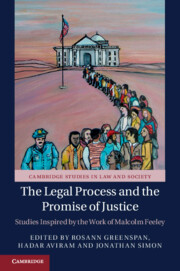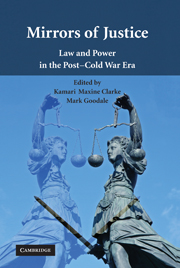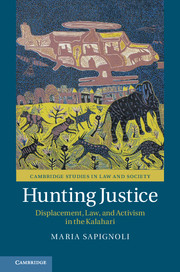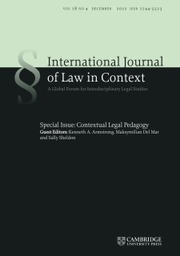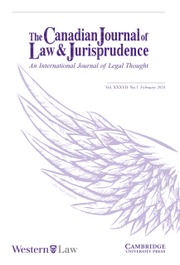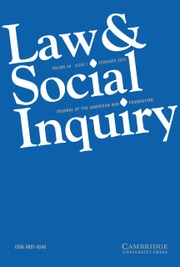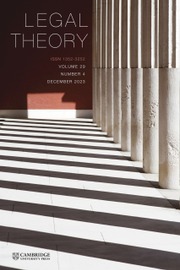The Legal Process and the Promise of Justice
Studies Inspired by the Work of Malcolm Feeley
Part of Cambridge Studies in Law and Society
- Editors:
- Rosann Greenspan, University of California, Berkeley
- Hadar Aviram, University of California, Hastings College of the Law
- Jonathan Simon, University of California, Berkeley
- Date Published: May 2022
- availability: Available
- format: Paperback
- isbn: 9781108401975
Paperback
Other available formats:
Hardback, eBook
Looking for an examination copy?
This title is not currently available for examination. However, if you are interested in the title for your course we can consider offering an examination copy. To register your interest please contact [email protected] providing details of the course you are teaching.
-
Malcolm Feeley, one of the founding giants of the law and society field, is also one of its most exciting, diverse, and contemporary scholars. His works have examined criminal courts, prison reform, the legal profession, legal professionalism, and a variety of other important topics of enduring theoretical interest with a keen eye for the practical implications. In this volume, The Legal Process and the Promise of Justice, an eminent group of contemporary law and society scholars offer fresh and original analyzes of his work. They asses the legacy of Feeley's theoretical innovations, put his findings to the test of time, and provide provocative historical and international perspectives for his insights. This collection of original essays not only draws attention to Professor Feeley's seminal writings but also to the theories and ideas of others who, inspired by Feeley, have explored how courts and the legal process really work to provide a promise of justice.
Read more- Offers international perspectives on issues formerly studied only in the context of the United States
- Sheds new light on lower courts scholarship
- Provides a one volume introduction to a core set of socio-legal research areas that share a common concern with legal process
Reviews & endorsements
'Malcolm Feeley’s writings about America’s contradictory crime wars and criminal justice reform efforts are essential elements of modern criminology. The contributors to this volume take Feeley’s thinking in new and innovative directions that no student or scholar of our continuing predicament will want or can afford to miss. A guide to a futuristic Feeleyian criminology!' John Hagan, John D. MacArthur Professor Professor of Sociology and Law, Northwestern University, Illinois
See more reviews'An extraordinary collection of insightful studies that follow the steps of Malcolm Feeley in relation to the legal process and the promise of justice. It explores the vibrant legacy of this brilliant scholar for the present and it will be a source of inspiration for the future theoretical and empirical developments in these key socio-legal themes, both inside and outside the English speaking contexts.' Máximo Sozzo, Universidad Nacional del Litoral, Argentina
'This festschrift for Malcolm Feeley, with contributions from eighteen distinguished scholars, provides powerful accounts of how lawyers and judges link policies of crime and punishment to fundamental problems of governing contemporary societies. Provocative and compelling, this collection confronts the current challenges to liberal democracies and the rule of law with trenchant, grounded analyses.' Susan S. Silbey, Leon and Anne Goldberg Professor of Humanities, Massachusetts Institute of Technology
'Far from being only a much deserved tribute to Malcolm Feeley, this book opens up new perspectives. By recalling the numerous insights of his scholarship, from The Process is the Punishment to debates on court reform or sociology of legal professionals, this rich array of scholars put these studies in perspective and demonstrate how fruitful his perspective is for socio-legal studies, in several national contexts. The same could even be said beyond that specific field, from the sociology of organizations to public policy analysis.' Liora Israël, École des Hautes Etudes en Sciences Sociales, Paris
Customer reviews
Not yet reviewed
Be the first to review
Review was not posted due to profanity
×Product details
- Date Published: May 2022
- format: Paperback
- isbn: 9781108401975
- length: 406 pages
- dimensions: 228 x 151 x 23 mm
- weight: 0.6kg
- availability: Available
Table of Contents
Introduction Jonathan Simon, Hadar Aviram and Rosann Greenspan
Part I. The Process is the Punishment:
1. Adversarial bias and the criminal process: infusing the organizational perspective on criminal courts with insights from behavioral science Hadar Aviram
2. Malcolm Feeley's concept of law Issa Kohler-Hausmann
3. Process as intergenerational punishment: are children casualties of parental court experiences? Kay Levine and Volkan Topalli
4. The process is the problem Shauhin Talesh
Part II. Court Reform on Trial:
5. Vaping on trial: e-cigarettes, law, and society Eric Feldman
6. Japanese court reform on trial David T. Johnson and Setsuo Miyazawa
7. Court reform and comparative criminal justice David Nelken
8. The birth of the penal organization: why prisons were born to fail Ashley T. Rubin
9. The misbegotten: infanticide in Victorian England Lawrence M. Friedman
Part III. Judicial Policymaking and the Modern State:
10. Judicial deference in the modern state Lauren B. Edelman
11. Judges, labor, and economic inequality Paul Frymer
12. Administrative 'states' of judicial policy on gender-motivated violence Christine B. Harrington
13. Can courts abolish mass incarceration? Jonathan Simon
14. Policy making by out-of-court settlements: intelligence informers at the Israeli High Court of Justice Menachem Hofnung
Part IV. Political Liberalism and the Legal Complex:
15. The international legal complex: Wang Yu and the global response to repression of China's political lawyers Terence C. Halliday
16. The legal profession's promise of justice: choices and challenges in legal and socio-legal work Mark Fathi Massoud
17. The varieties of judicial independence and the judiciary's role in political reform Edward L. Rubin
18. The legal complex and lawyers-in-chief Kim Lane Scheppele.
Sorry, this resource is locked
Please register or sign in to request access. If you are having problems accessing these resources please email [email protected]
Register Sign in» Proceed
You are now leaving the Cambridge University Press website. Your eBook purchase and download will be completed by our partner www.ebooks.com. Please see the permission section of the www.ebooks.com catalogue page for details of the print & copy limits on our eBooks.
Continue ×Are you sure you want to delete your account?
This cannot be undone.
Thank you for your feedback which will help us improve our service.
If you requested a response, we will make sure to get back to you shortly.
×
